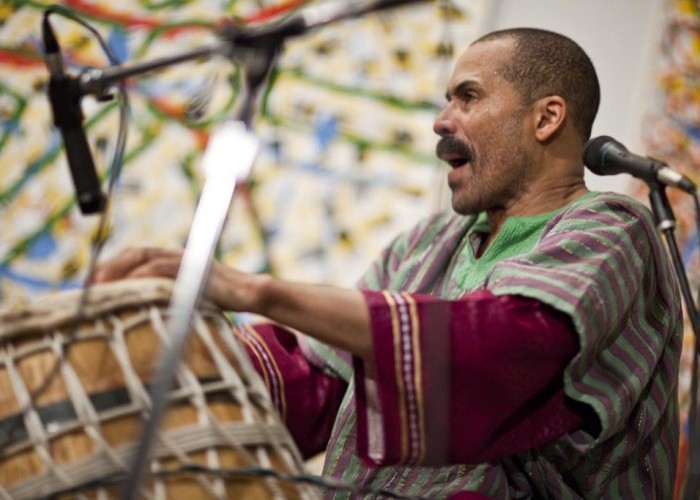Jan 13, 2026 2:09 PM
More Trump-Kennedy Center Cancellations
The fallout from the renaming of the John F. Kennedy Center for the Performing Arts to include President Donald…

Chicago percussionist and bandleader Kahil El’Zabar has a pair of recordings slated for release on Spiritmuse, a new UK imprint.
(Photo: Courtesy Spiritmuse)It’s a unique opportunity to bring these four musicians together under the idea of the science of the groove. It’s not just some sentimental statement. There’s a lot of knowledge that goes into the fervor of building a sound in a groove-based music. Ornette [Coleman] found [bassist] Jamaladeen Tacuma in his youth to be a very exciting player, because he had a natural sense of blending harmonic distinctions along with being able to hold a line, hold a pattern, hold a groove. He was a great foil for the later Ornette Coleman sound, because of his own harmolodic sensibilities. [Saxophonist] Gary Bartz is a master at subtle impact, but he’s got so much knowledge of the instrument from Bird licks to Ornette licks to his own style and his relationship with Pharoah [Sanders] over the years. And [pianist] Robert Irving III has those natural proclivities for composition. That’s what Miles [Davis] saw. The voicings that Bobby had developed and can creatively come up with gave Miles a new kind of sound with his instrument. It made Miles sound better, same thing with Nancy Wilson, Wayne Shorter—so many other people. He worked with me over the years in small ensembles and the large Orchestra Infinity. In a small group with him, you’re always going to get voicings, harmonic sensibilities that’s just going to expand the group.
While you receive so much acclaim in Europe, you’ve stayed rooted in Chicago. What do you see as the city’s importance, especially now?
The 1920s are known as the Jazz Age, accepted worldwide. It started in New Orleans, but it grew up in Chicago. When those musicians went to Europe, it changed the 20th century forever. They brought in a spontaneity, a newness that was considered modernity. Now, with 2020 coming, everyone’s looking at a collective urban sensibility that goes from Nigeria to the suburbs of Paris to São Paulo to Taiwan to Chicago. The idea that with technology and communication across the planet, music and art has become a conduit to humanity, that with all of our diverseness, there’s still some uncommon elements that we can trust in in a real, substantive way.
At the beginning of 20th century, the music of Louis Armstrong, Sidney Bechet and Daniel Burnham’s city plan became influential models, globally. Now, with Chicago being one of the largest fresh water basins in the world, it has developed soul, spirit, energy and become a place of enormous cultural wealth. The artists that come from that core reflect, project and give something that’s received throughout the planet now. DB

Belá Fleck during an interview with Fredrika Whitfield on CNN.
Jan 13, 2026 2:09 PM
The fallout from the renaming of the John F. Kennedy Center for the Performing Arts to include President Donald…

Peplowski first came to prominence in legacy swing bands, including the final iteration of the Benny Goodman Orchestra, before beginning a solo career in the late 1980s.
Feb 3, 2026 12:10 AM
Ken Peplowski, a clarinetist and tenor saxophonist who straddled the worlds of traditional and modern jazz, died Feb. 2…

The success of Oregon’s first album, 1971’s Music Of Another Present Era, allowed Towner to establish a solo career.
Jan 19, 2026 5:02 PM
Ralph Towner, a guitarist and composer who blended multiple genres, including jazz — and throughout them all remained…

Rico’s Anti-Microbial Instrument Swab
Jan 19, 2026 2:48 PM
With this year’s NAMM Show right around the corner, we can look forward to plenty of new and innovative instruments…

Richie Beirach was particularly renowned for his approach to chromatic harmony, which he used to improvise reharmonizations of originals and standards.
Jan 27, 2026 11:19 AM
Richie Beirach, a pianist and composer who channeled a knowledge of modern classical music into his jazz practice,…